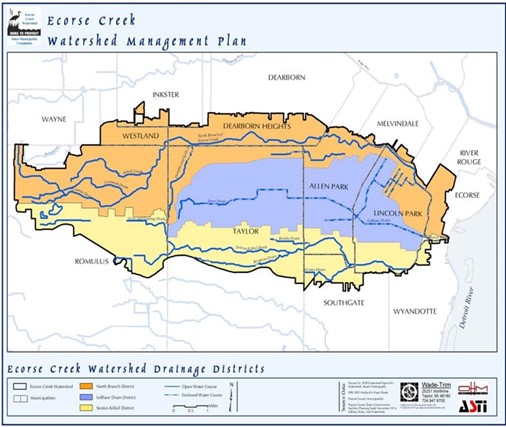Project seeks to find solutions to reduce flooding in Ecorse Creek watershed
Residents asked to take online survey, attend community meetings to share input on potential restoration projects.

Ecorse Creek is a 43-square-mile highly urbanized watershed that flows into the Detroit River in Wayne County. Communities around Ecorse Creek have experienced significant flooding for decades. The Ecorse Creek Committee was formed out of the Alliance for Downriver Watersheds in 2019 to address these concerns, with their actions guided by a management plan.
A high amount of impervious surfaces (such as parking lots and roads) and an inadequate stormwater infrastructure have worsened flooding in the Ecorse Creek watershed. When water cannot soak into the ground, it flows across the surface and into storm drains. Storm drains cannot always handle the quantity of water received, or the combination of debris and stormwater, and this can lead to flooding.
In addition to flooding, the creek is subject to low water quality, little habitat diversity, and varying levels of water flow. These issues impact recreational use and enjoyment of the creek by residents, as well as limit the availability of suitable habitat for aquatic organisms.
Potential restoration projects
In 2022, the Ecorse Creek Committee partnered with Friends of the Detroit River and received funding from Michigan’s Nonpoint Source Program to gain community input on potential locations for restoration projects that would reduce stormwater-related flooding as well as leading to improvements in water quality, natural habitat, and recreational opportunities.
Community input critical
Gathering community feedback is a critical step to gauging the interest and potential for projects to reduce flooding and restore ecosystem function. Community members are encouraged to participate in a survey and upcoming community meetings to help identify potential locations for restoration projects that are within 1,000 feet of the creek or a connected tributary.

- Communities within the Ecorse Creek watershed include Allen Park, Dearborn Heights, Ecorse, Inkster, Lincoln Park, Melvindale, Romulus, Southgate, Taylor, Westland, and Wyandotte.
- The survey is now available for community members who live near Ecorse Creek to provide feedback. The survey is also available in Spanish and Arabic.
- In addition to the survey, several community meetings will be held in 2023.
- More information about this project is available on the Friends of the Detroit River website.
The Ecorse Creek Committee encourages community members to participate in the survey, and to share it with their friends and neighbors. Please direct any questions about the survey or this project to McKenzi Waliczek, Stewardship Director for Friends of the Detroit River at mwaliczek@detroitriver.org.
Friends of the Detroit River (FDR), a nonprofit, was formed in 1992 by a group of citizens dedicated to preserving and maintaining the habitat of the Detroit River. Founded on the belief that coastal wetland habitats in the Detroit River are the responsibility and privilege of all the area’s citizens, FDR works to rehabilitate and restore many of the area’s shorelines. FDR has also managed the Detroit Riverkeeper program since 2002. FDR serves as the fiduciary for the Detroit River Public Advisory Council, a group established in 1991in conjunction with the Great Lakes Areas of Concern Program to facilitate public involvement in cleanup efforts due to legacy contaminants and environmental issues.
Michigan Sea Grant helps to foster economic growth and protect Michigan’s coastal, Great Lakes resources through education, research, and outreach. A collaborative effort of the University of Michigan and Michigan State University and its MSU Extension, Michigan Sea Grant is part of the NOAA-National Sea Grant network of 34 university-based programs.
This article was prepared by Michigan Sea Grant under award NA180AR4170102 from the National Oceanic and Atmospheric Administration, U.S. Department of Commerce through the Regents of the University of Michigan. The statement, findings, conclusions, and recommendations are those of the author(s) and do not necessarily reflect the views of the National Oceanic and Atmospheric Administration, the Department of Commerce, or the Regents of the University of Michigan.



 Print
Print Email
Email




